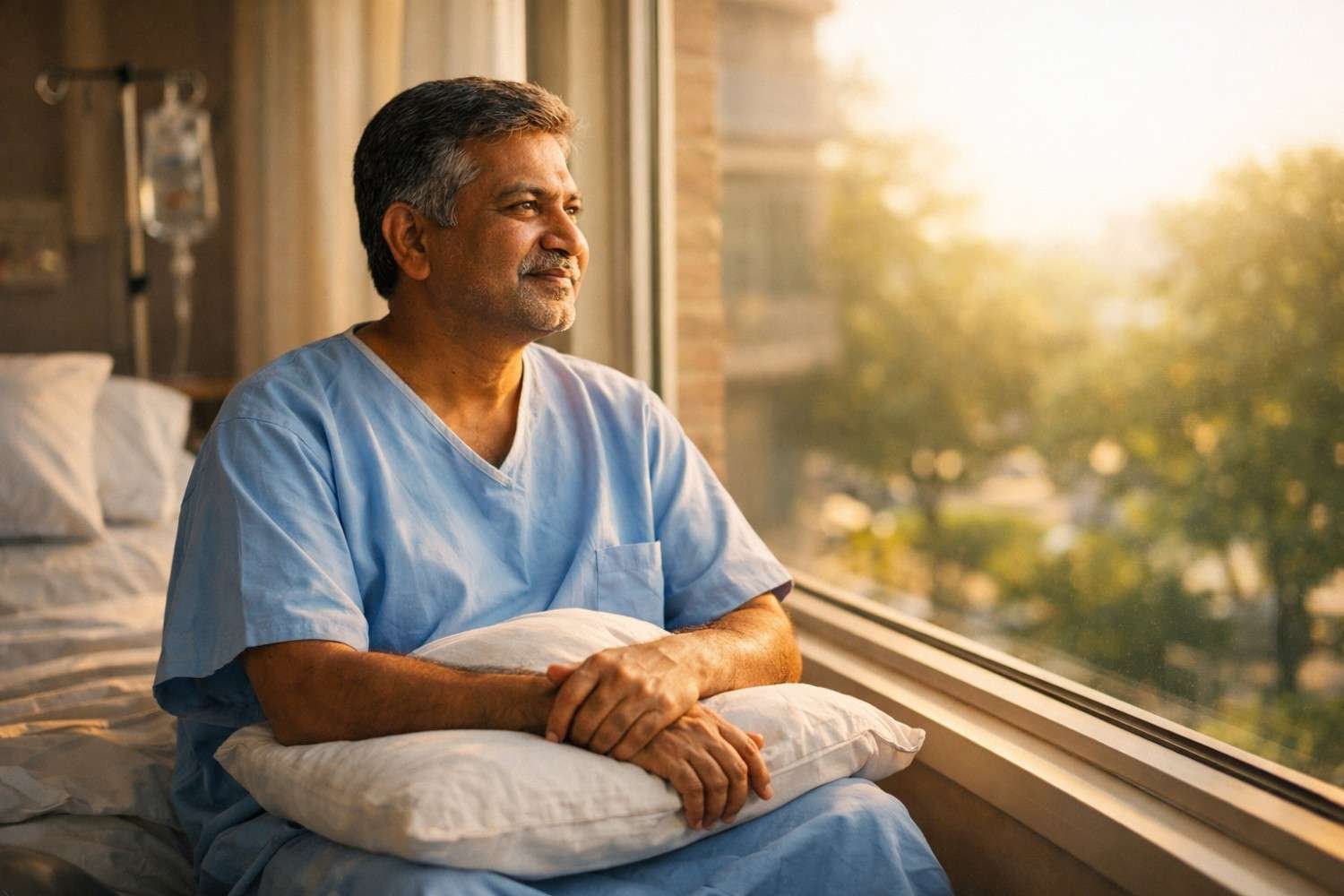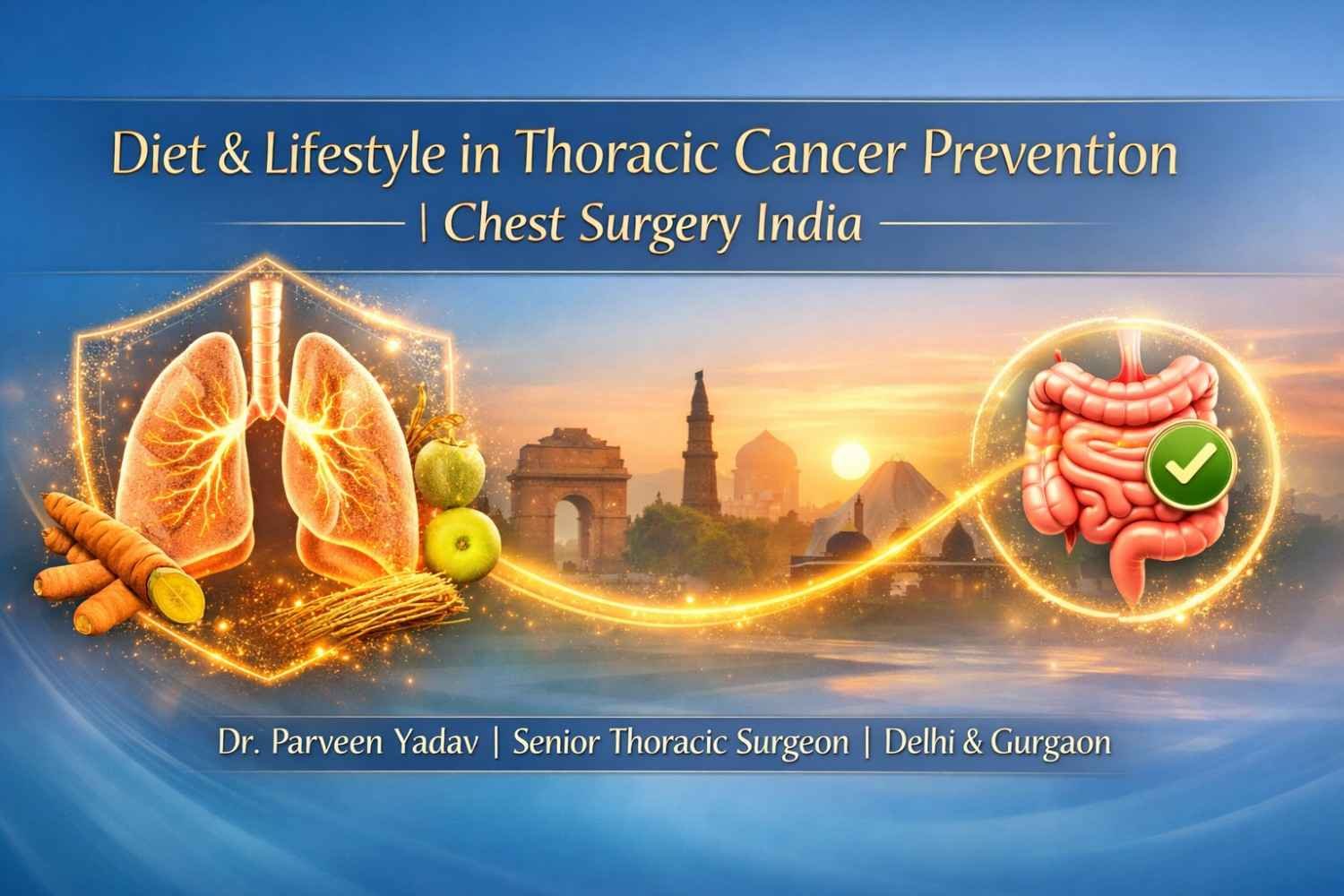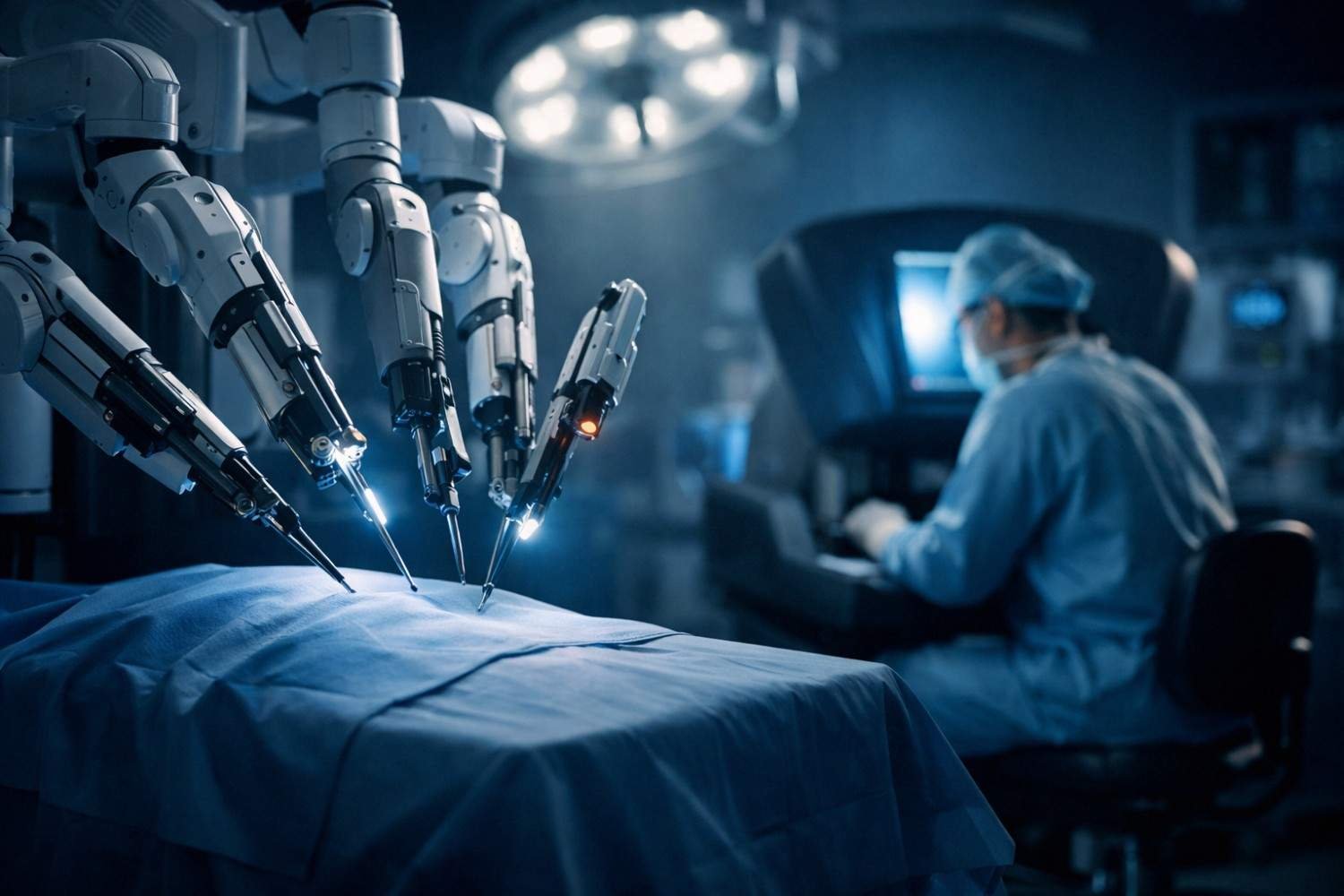

A second opinion involves having an independent specialist review your diagnosis and treatment plan. It's a crucial step to confirm your path, explore all available options, and gain the confidence needed to move forward with your care.
Hello, I am Dr. Parveen Yadav, a thoracic surgeon based in Gurgaon. Over my years of practice, I have sat with hundreds of patients and their families at one of the most difficult moments of their lives: right after a lung cancer diagnosis. I have seen the shock, the fear, and the overwhelming flood of questions that follow. It’s a journey no one asks to be on.
In that moment of uncertainty, your mind races. "What happens next? Is the diagnosis correct? Are we doing everything we can?" These are not questions of doubt; they are questions of a responsible person wanting to ensure the best possible path forward.
That is why I am writing this today. I want to talk to you not just as a surgeon, but as a guide. I want to explain why the single most powerful, proactive, and positive step you can take right now is to seek a second opinion. It is not about questioning your current doctor. It is about empowering yourself with complete knowledge and absolute confidence in the fight ahead. This decision could be the most important one you make.
The single most common benefit my patients mention after getting a second opinion is not a new drug or a different surgery—it’s “peace of mind”. A cancer diagnosis throws your world into chaos. A second opinion is how you begin to restore order.
Think of it this way:
This is you taking control of your health journey. It is an act of self-advocacy. And let me be very clear: seeking a second opinion is a standard, respected, and completely normal part of cancer care. Any confident and capable doctor will support your desire to be fully informed. They understand that your confidence in the treatment plan is essential for a successful outcome. If you ever feel hesitant or worried about offending your doctor, remember that this is about your life and your health. You have every right to gather all the information you can.
Lung cancer is not one disease; it is a highly complex group of diseases. The field is advancing at a breathtaking pace, with new discoveries and treatments becoming available every year. It is a full-time job just to keep up with the latest breakthroughs for lung cancer, let alone all other types of cancer. This is why a second opinion from a specialist is so critical.
Most experts agree that it is increasingly difficult for general oncologists to stay current with the nuances of every specific cancer. A specialist who focuses only on lung cancer will have a deeper understanding of these critical areas:
One of the biggest triggers for a second opinion is if comprehensive genomic testing (also called biomarker or molecular testing) has not been performed. This isn't just a routine test; it's a roadmap. By analysing a sample of the tumour, we can identify specific genetic mutations that are driving the cancer.
Why does this matter? Because today, we have powerful "targeted therapies" and "immunotherapies" that are designed to attack those specific mutations. These are not like traditional chemotherapy. They are often more effective and can have far fewer side effects. If you don't have this testing done, you may be missing out on the most advanced and personalised lung cancer treatment in Gurgaon and across India. A second opinion can ensure this vital step is not overlooked.
For early-stage lung cancer, surgery is often the best chance for a cure. But not all surgeries are the same. The old approach of a large open incision in the chest (thoracotomy) is often no longer necessary.
Today, as a second opinion thoracic surgeon in India, I and other specialists perform the vast majority of our operations using minimally invasive techniques like Video-Assisted Thoracoscopic Surgery (VATS) or Robotic-Assisted Thoracic Surgery.
The benefits for the patient are immense: less pain, smaller scars, shorter hospital stays, and a much faster return to normal life. A second opinion with a surgeon who specialises in these advanced techniques can determine if you are a candidate for a less invasive and more precise operation.
Clinical trials are how we make progress against cancer. They provide patients with access to the next generation of treatments before they are widely available. Major cancer centres and hospitals in cities like Gurgaon and Delhi are often hubs for these trials. A general oncologist in a smaller town may not be aware of all the trials you could be eligible for. A second opinion at a high-volume centre can open doors to cutting-edge therapies that could make all the difference.
Here is something that most people don't realise. We often assume a second opinion is about finding a more aggressive treatment. But often, the opposite is true. The goal is not just to treat the cancer, but to treat the person. Your quality of life during and after treatment is just as important as the outcome.
A recent study from a major international cancer centre, Memorial Sloan Kettering, found something remarkable. When their experts gave a second opinion, about one in three patients had their treatment plan changed. Most often, the change was to a less intense treatment.
Another detailed academic study published in a peer-reviewed journal looked at 120 second opinion cases. It found that of the plans that were changed, 21 involved eliminating or reducing the extent of surgery, and 9 involved shifting from active treatment to careful observation.
This is called "treatment de-escalation." It is a sophisticated approach that comes from deep expertise. An experienced specialist can sometimes determine that a smaller surgery will be just as effective as a larger one, or that a shorter course of radiation is sufficient. This concept of avoiding overtreatment is a powerful reason to seek a second opinion. It’s not just about adding years to your life, but adding life to your years.
Knowing you need a second opinion is one thing; getting one can feel like a daunting task, especially when you are already overwhelmed. Let’s break it down into simple, manageable steps.
Being organised is your best tool. Before your appointment, make sure you have a complete file with all your medical records. Your new doctor will need to see everything to give you a truly informed opinion. Create a folder and include:
Requesting your records in India can sometimes be a challenge, but it is your right as a patient.
When seeking a second opinion, especially if surgery is a possibility, it is vital to see the right kind of expert. You wouldn't go to a general physician for a heart bypass; similarly, for lung cancer, you need a specialist.
A thoracic surgeon is a surgeon who specialises only in operations on the organs inside the chest, including the lungs. A thoracic surgical oncologist has even more focused training specifically on operating on cancers within the chest.
This specialisation is not just a title; it translates into experience. A dedicated thoracic surgeon performs these complex operations day in and day out. This high volume leads to better precision, lower complication rates, and ultimately, better outcomes for patients.
| Factor | General Oncologist / General Surgeon | Second Opinion with a Thoracic Specialist |
| Scope of Expertise | Treats many different types of cancer. | Deep, focused expertise only on lung and chest cancers. |
| Surgical Experience | May perform a wide variety of surgeries. | High volume of specialised lung surgeries (VATS, Robotic). |
| Access to Technology | May be based in a hospital with standard equipment. | Often based in major centres with the latest technology like the da Vinci robot. |
| Clinical Trial Access | May have limited knowledge of available lung cancer trials. | Actively involved in and aware of cutting-edge clinical trials for lung cancer. |
| Treatment Philosophy | May follow standard, established protocols. | More likely to incorporate the latest research and nuanced approaches like treatment de-escalation. |
When looking for a second opinion thoracic surgeon in India, ask about their experience. How many VATS or robotic lung surgeries do they perform each year? This focus and experience are what you are looking for.
To make the most of your appointment, go prepared with a list of questions. It can be helpful to bring a family member or friend to help take notes. Here are some of the most important questions to ask:
Receiving a lung cancer diagnosis is a heavy burden, but you do not have to carry it with uncertainty. A second opinion is your right, and it is your most powerful tool. It provides clarity, confidence, and control. It ensures you have explored every possible avenue and are making fully informed choices.
The world of lung cancer treatment is constantly evolving. New and better options are becoming available right here in India. Your treatment plan should reflect the very latest in medical science.
Whether it confirms your current path or opens your eyes to a new one, a second opinion empowers you to move forward knowing you have done everything possible to secure the best future for yourself and your family.
Ready to Take the Next Step for Your Lung Cancer Treatment in Gurgaon?
If you or a loved one is facing a lung cancer diagnosis and would like a comprehensive, confidential, and compassionate second opinion, I am here to help. We can review your case, discuss all available options, and create a clear plan for the road ahead.
Contact my office today to schedule a consultation.

18+ Yrs Exp | 5,700+ Thoracic & Robotic Cancer Surgeries
Dr. Parveen Yadav is a Director and Senior Consultant in Thoracic and Surgical Oncology, specializing in minimally invasive and robotic lung and esophageal surgeries, with advanced training from AIIMS and Tata Memorial Hospital.
View Full Profile Pain After Thoracic Surgery: Tips for Smooth Recovery
Pain After Thoracic Surgery: Tips for Smooth Recovery
 Diet & Lifestyle for Thoracic Cancer Prevention | Dr. Parveen Yadav
Diet & Lifestyle for Thoracic Cancer Prevention | Dr. Parveen Yadav
 Robotic Thoracic Surgery: How Da Vinci Technology is Revolutionizing Chest Procedures
Robotic Thoracic Surgery: How Da Vinci Technology is Revolutionizing Chest Procedures
Struggling with pain after chest surgery? Dr. Parveen Yadav shares expert recovery tips, causes of shoulder pain, PTPS signs, and what your discharge sheet won't tell you.
Discover how diet, breathing exercises & daily habits help prevent and recover from thoracic cancer. Expert insights from Dr. Parveen Yadav, Chest Surgery India
Discover how Da Vinci robotic surgery is transforming chest procedures in Gurgaon. Less pain, faster recovery & expert care by a certified thoracic surgeon
Copyright 2026 © Dr .Parveen Yadav all rights reserved.
Proudly Scaled by Public Media Solution!